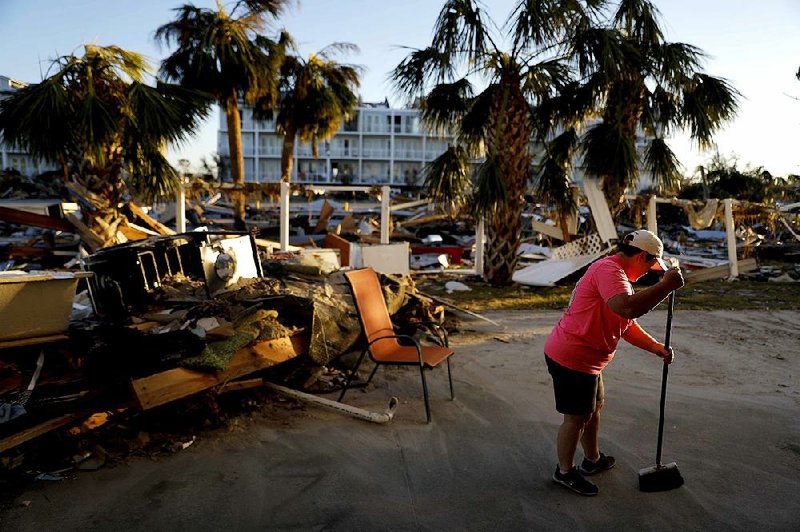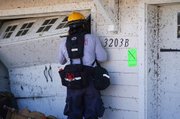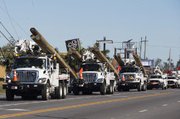MEXICO BEACH, Fla. -- Rescuers intensified efforts Saturday to find survivors who might be trapped in the ruins of a small Florida panhandle community nearly obliterated by Hurricane Michael, where one body has already been recovered, tempers are flaring, and power is feared to be out for weeks.
Crews with dogs went door to door in Mexico Beach, pushing aside debris to get inside badly damaged structures in a second wave of searches after what they described as an initial, "hasty" search of the area. About 1,700 search-and-rescue personnel have checked 25,000 homes, Florida Gov. Rick Scott said.
Authorities say there is little doubt the death toll will rise from the storm, which made landfall Wednesday as a Category 4 hurricane with 155 mph winds and heavy storm surge. The tally of lives lost across the South stood at 15, including the victim found in the rubble of Mexico Beach, where about 1,000 people live.
"Everything is time consuming," said Capt. Ignatius Carroll, of the South Florida Urban Search and Rescue task force. "You don't want to put a rush on a thorough rescue."
More roads were passable along the storm-ravaged coast as crews cleared downed trees and power lines, but traffic lights remained out and long lines heightened tensions at one of the few open gas stations.
"I want you to get back in your vehicle and stop!" one woman shouted at a man accosting her as she tried to squeeze her car between two idling vehicles at a Panama City service station running two fuel pumps on a generator.
"You're an idiot!" the man shouted back.
About 4,000 members of Florida's National Guard have been called up to deal with the storm, including 500 added on Saturday. Nearly 2,000 law enforcement officials have been sent into the panhandle.
Schools will stay closed indefinitely, a hospital halted operations and sent 200 patients to hospitals elsewhere in Florida and in Alabama, and more than 253,000 customers in the panhandle remain without power.
"Everybody just needs to help each other right now," Scott said after meeting with emergency responders in the Panama City area.
"You feel sorry for people," Scott said. "They might have lost their house. They worry about their kids getting into school. You know, people don't sit and have a whole bunch of extra money in the bank just waiting for a disaster."
Some residents were packing up and getting as far away as they could.
Jeff and Katrina Pearsey, with a ruined rental home in the Panama City area and no indication of when they could again earn a living, said they were heading to Bangor, Maine, where Katrina once worked as a nurse. Several trees toppled on their property, including one that smashed through the roof.
"We're getting our stuff and we're going," said Jeff Pearsey, 48. "We're probably done with Panama City."
Michael was one of the most powerful hurricanes to ever make landfall in the U.S. While most residents fled ahead of the storm's arrival, others stayed to face the hurricane. Some barely escaped with their lives as homes were pushed off their foundations and whole neighborhoods became submerged.
Hector Morales, a 57-year-old restaurant cook, never even thought of evacuating. His mobile home wasn't on the beach but when it suddenly began floating during the hurricane, he jumped out and swam to a fishing boat and clambered aboard.
"I lost everything," Morales said. "But I made it."
How many others were not so fortunate was still not clear. By one count, state officials said, 285 people in Mexico Beach defied mandatory evacuation orders and stayed behind. It's unclear how many people stayed behind in nearby communities.
One who did, Albert Blackwell, was preparing on Saturday to cover holes in the roof of his apartment and take a chain saw to trees that fell and broke his windows just outside Panama City.
"I'm the idiot that rode it out here in this place," said Blackwell, 65, sweat dripping from his face. He doesn't plan to leave; he wants to protect his home from looters.
Michael also drubbed Florida's inland rural communities with such unexpected brutal force that it left residents and officials stunned -- and facing a daunting recovery.
"There's a group of us who have been warning about this for years," said Rodney Andreasen, director of emergency management for Jackson County. Andreasen said the area felt sustained winds of 130 to 140 mph.
By the time Michael crossed into Georgia, it was still classified as a major Category 3 hurricane with a clearly defined and devastating eye.
"We're only 40 miles from the coast as the crow flies, and hurricanes don't respect coastlines," Andreasen said.
Still, Andreasen could not have foreseen the magnitude of devastation in his county in Florida: Much of the county's road department was a pile of rubble. The sheriff's office lost its roof. Even the generator at the emergency operations complex failed Thursday night, before another one was brought in.
The first sign of help Darryl Brunson and his brothers said they saw was on Friday, when marked police cars raced down their street, their intent unclear, and maneuvered across an obstacle course of trees. A few minutes later, heavy equipment yanked one of the huge tree trunks from the ground and hauled it away.
"Everything else we cleaned ourselves with our bare hands," said Brunson, 27.
The hurricane's winds were so strong, Brunson said, that he did not hear a tree snap and fall in his own front yard -- away from the house, luckily, and away from his four children, who range in age from 1 to 6.
"We didn't figure it was going to be this bad," he said, debris from the storm scattered around him. A gate that belonged in the backyard was in the front yard, as was what was left of a playhouse. A trampoline he thought he had secured tore a hole in his roof.
In Quincy, a line dozens of cars deep stretched into the road Friday morning from a parking lot in a prison next to a National Guard armory, where service members offered families cases of water, boxes of ready-to-eat meals and roof tarps. Shortly after the trucks pulled in, word had spread around town -- in spite of the lack of power and cellphone service -- that some help had arrived.
"There's no shower. We can't use the toilet," said Halina Ciucci, whose home relies on well water powered by an electric pump. "We're hoping we can find an open ATM to get cash because no one is taking credit cards."
Ciucci, who moved years ago from Fort Lauderdale after losing everything in Hurricane Wilma in 2005, experienced the storm inside a mobile home. "It was horrible," she said. "I'm from down south, and this is the worst I've ever been in."
Shakeria Dillard and Davaughn Wilson arrived in a van and asked for tarps for their damaged roof and anything they could get for their four children. They said they feared their power would not return for weeks.
"We're going to have to stay," Dillard said. "Money is limited."
Emergency officials said they've received thousands of calls asking about missing people, but with cellphone service out across a wide area, they found it impossible to know who among those unaccounted for were safe but just unable to dial out to friends or family members.
Federal Emergency Management Agency chief Brock Long said he expected the death toll to rise. Searchers were trying to determine if the person found dead in Mexico Beach had been alone or was part of a family.
Authorities have set up distribution centers to dole out food and water to survivors. They've also set up a triage tent to treat residents who might have stepped on nails or cut themselves on debris.
President Donald Trump announced plans to visit Florida and hard-hit Georgia this week but didn't say what day he would arrive. On Saturday, he approved federal disaster relief for four Alabama counties affected by the storm.
"We are with you!" he tweeted.
Information for this article was contributed by Russ Bynum, Brendan Farrington and Gary Fineout of The Associated Press and by Patricia Mazzei of The New York Times.
A Section on 10/14/2018



